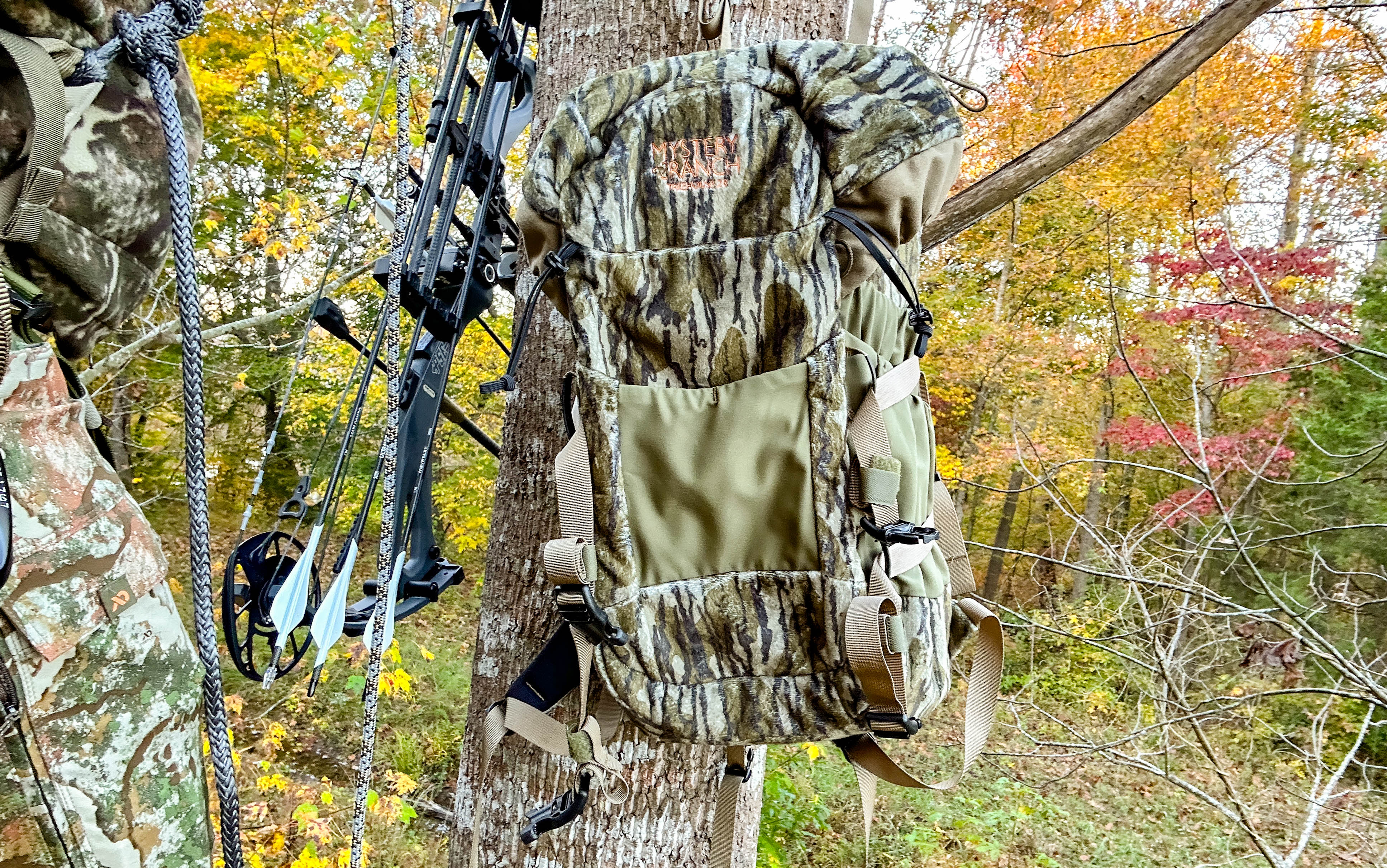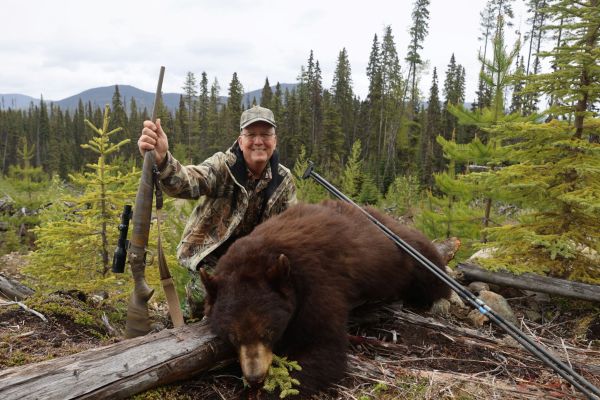We may earn revenue from the products available on this page and participate in affiliate programs. Learn More ›
Bowhunting whitetails is a game that involves a lot of moving pieces, and bowhunting backpacks keep all those pieces together. A bow, arrows, tree stand, climbing sticks, binoculars, rangefinder, release aid, pruning saw, scents, calls, the list goes on, and you’ve got a lot of gear to carry, which means you need a pack to carry it all.
A good bowhunting pack should carry all the gear you need for your specific hunting style. They should also keep your gear organized so you can access what you want, when you want it. Long, slow sits on stand or in the blind can turn into a frenzy of action at the blink of an eye. And sometimes you need to quickly access your call, a rangefinder, or a release so you don’t fumble the encounter. But you also don’t want a pack that feels like there’s a sack of corn slung on your back via strands of bailing twine. The best bowhunting backpacks should feel like they’re part of you; like they’re fused to your spine and shoulders, and you’d be hard pressed not to find one on this list that won’t work for your specific needs.
Things to Consider When Buying a Bowhunting Pack
Carrying Capacity
Depending on how much gear you plan to take to the woods, you need a pack that can adequately hold your stuff. If you take a lot of gear, you want a big pack. If you take just a few essentials, then you want something smaller or even a minimalist option.
Manufacturers list the carrying capacity of the backpacks in cubic inches. For this article, I’m talking about backpacks used for one-day bowhunts. I’m not looking at packs that can carry tents, cooking supplies, food for a couple days, plus all your bowhunting gear. Most bowhunters will do well with packs that fall in the 1,500-3,000 cubic-inch range.
Fit
You’ll know after one hunt if a backpack fits you or not. Comfortable shoulder straps protect against rubbing. Good padding on the back of the pack protects your back. And if you’re carrying a heavy load, a waist belt can help manage it, so the pack feels lighter than it is. A good pack will have plenty of adjustability in the shoulder and waist straps so you can make it fit as snug or as loose as you want. If you come out of the field after a hunt and your shoulders and/or back hurt, your pack doesn’t fit you properly or it needs to be adjusted.
Access
Organizing your gear is as important as hauling it. Does your pack have intuitive pockets? Nothing is more frustrating than having to dig deep into the main space for every little piece of gear you need, especially when you’re trying to remain hidden. The best bowhunting backpacks will have separate pockets perfectly placed for calls, scents, your release aid, and other important gadgets. When you’re buying a pack, imagine you’re in your stand and the pack is attached to your tree. What do you need to access and is there a pocket positioned that allows you to quickly access that gear?
Best Bowhunting Backpacks: Reviews and Recommendations

Plenty of room and excellent comfortability at an affordable price.
See It
Key Features
- Capacity: 2,700 cubic inches
- Weight: 4 pounds, 1 ounce
- Main pocket storage
- Sturdy handle
- Comfortable shoulder straps and waist belt
- Organizational shelf pocket
- Blaze orange rain cover
Why It Made the Cut
This pack has plenty of room to haul everything you need to sit on the stand all day without the bulk and rigidity of a frame pack and runs just under $100.
Pros
- Large main pocket area
- Tons of pockets for organizing gear
- Comfortable when hauling heavy loads
- Waist belt with pockets
- Great price
Cons
- Not a fan of the aluminum spine (but the bar is removable, so this con is fixable)
Product Description
I’m someone who hauls a lot of gear into the woods when I bowhunt, and this pack has plenty of room, without the bulk and weight. And it costs under $100. So the pursuit pack hits the trifecta for me and is one of the best hunting backpacks available. The Pursuit has the capacity to carry anything and everything I want. The storage capacity is listed as 2,700 cubic inches, but its hauling capacity is even greater when you start strapping things to the outside. The deep main compartment has the capability to hold even the heaviest of layers. And on long walks to a stand where I want to avoid sweating, I stuff in both a pair of bibs and a heavy coat on top of all my food, drink, and hunting gear I need to spend the day in the stand.
Having said that, I like using one pack all season long. Once I get my basic gear organized – tree hooks, calls, knife, flashlight, etc. I don’t want to transfer it and reorganize it in another pack. That’s a recipe for me to leave something behind. In the early season, obviously, I don’t need all the space in the Pursuit’s cavernous main pocket, where I typically carry extra layers once the mercury dips. But I’d rather use one pack all season than switch halfway. And since this pack is lightweight, I don’t mind carrying it in the early season, even though it’s not filled.
Another great feature of the Pursuit pack is the organization shelf that’s part of a large front pocket on the pack. Unzip the pocket face all the way, and the rigid face falls forward to serve as a shelf held in place by straps. There are mesh pockets on the shelf and there are several other small pockets on the vertical face that’s now exposed for stowing gear like a rangefinder, grunt tube flashlight and other things you might want to grab quickly while in the stand. With the shelf exposed, these things are right at your fingertips.
The pack also has mesh-bottom pockets on the bottom of each side of the pack, and corresponding straps at the top. The mesh pocket and strap on one side of the pack is the perfect place to store my tree stand umbrella when I’m expecting rain. It’s a much better spot for the umbrella than putting it inside the pack, especially for the walk out when it’s all wet. The mesh pocket and strap on the other side would be great for a camera arm if you film your hunts.
On top of all these features, there’s a drop-down pouch stowed in the bottom of the pack that you can lower, set one cam of your bow in, and then strap the upper part of your bow to the top of the pack when you need both hands to drag that big buck out of the woods by yourself.
Read Next: Best Hunting Backpacks
Best for Saddle Hunting: Mystery Ranch Treehouse 20

Photo by Scott Einsmann
See It
Key Features
- Bottom compression strap
- Internal cinch pockets with silent closures
- Front stretch-woven stash pocket
- Lid pocket
- Hydration reservoir compatible
- Bow or lightweight stand carry via compression straps
- Top haul loop for hanging from the tree
- Fuzzy polyester fabric exterior
- Nylon 210D laminate fabric backing
- YKK zippers
- Weight: 2.8 pounds
- Capacity: 1275 cu. in.
- Dimensions: 20.5 X 10.5 X 11 inches
Pros
- Quiet material
- Smart features for whitetail hunting
- Semi-rigid bag is great for protecting items inside the bag while cinching down a stand on the exterior
Cons
- Not ideal for carrying heavy loads

Photo by Scott Einsmann
The first time I hunted with my friend Taylor Chamberlin I learned what it meant to have your gear fully dialed. His saddle system was completely quiet, easy to carry, and he was up the tree before I had my sticks untangled. Since then I’ve been on a quest to replicate the good habits he has and a big part of that is finding a pack that integrates well with my sticks and platform. The Mystery Ranch Treehouse 20 is that pack for me.
With it I can carry my hunting gear, a camera arm, camera, an extra layer, water, and strap my sticks and platform to the outside. It holds the sticks and platform securely and quietly.

The keys to strapping your platform and sticks to the pack are: Stealth Strip all metal-on-metal contact points. Tightly cinch your sticks to your platform — I use the rubber strap that came with my Latitude Outdoors Carbon SS sticks.
Once you’ve done that, attaching the sticks and platform to the Treehouse is really simple. I just use the two compression straps on the front of the pack to buckle everything down.
The Treehouse is designed to be user friendly 15 feet up. You can access the contents of the top lid with it open and it’s where I like to keep essentials like my release aid, wind checker, and grunt tube. The interior of the pack has good organization while allowing maximum room for the main compartment. That’s really nice when you’re cramming bulk layers into the pack.
I looked at the Treehouse 38 and almost went with it over the 20, but now that I’ve hunted a lot with the 20 I don’t think I’d use the extra space and I’d certainly notice the extra bulk of the 38. If you’re running a hang on and sticks or will pack out meat, the 38 is a better option. —Scott Einsmann
Best for Elk Hunting: Stone Glacier Sky 5900 and Xcurve Frame
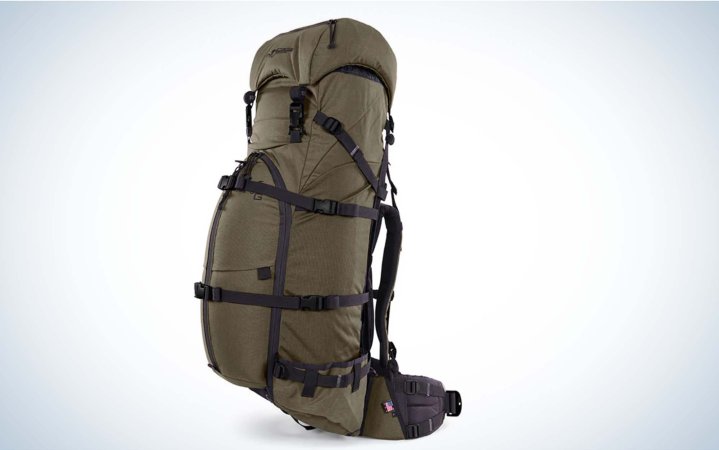
See It
Score Card
- Day Hunting: 5
- Pack Out: 5
- Loading Ease: 4
- Price/Value: 4.5
Key Features
- Heavy-duty YKK #10 zipper
- Cordura 500 and Xpac fabric
- 1-inch Duraflex military approved buckles and webbing
- Measured Base Weight (Frame, Bag, and Lid): 5.6 pounds
- Frame has carbon composite stays (4 total)
- 26-inch frame height
- 5,400 cubic inch main bag
- More than 2,500 cubic inch expandable load shelf
- Lifetime warranty
- Price: $695 with Xcurve Frame
Pros
- Great all-around performance
- Very Good Heavy Load Comfort
- Excellent Day Hunting Comfort
- Quality build
- Lightweight
- Includes Lid
- Made in USA
Cons
Stone Glacier offers two frames for the Sky 5900: the traditional flat-backed Krux frame or the more anatomically shaped Xcurve. The Xcurve was the obvious choice for my curvy lumbar. Stone Glacier has a wide, padded hip belt that tightens comfortably around the iliac crest (hip bone) and holds secure. The Velcro-attached shoulder straps are easily adjusted and customized to the hunter’s back. I also found the Cordura 500d and Xpac fabrics to be tough and durable.
The Xcurve Frame handled the day hunt and heavy pack test with similar ease. The suspension is great at transferring weight to the hip belt with effective load lifters on the shoulder straps. The hip belt was my second favorite in the test, just a hair behind the Kifaru I tested. There is some disassembly needed to get the bag away from the frame to haul meat in the load shelf. The process is fairly straightforward and gets easier with practice. Watch the below video to see how it’s done.

The Sky 5900 bag has a minimalist design with just a large vertical pocket on the back panel to go with the lid and side pockets. The 5400 cubic inch main compartment can be accessed either from the top with the bag upright, or the full panel zip when laid down. Organization with the Sky 5900 is best with the use of separate internal organizing pockets like dry bags or, Stone Glacier’s Swing Out Pockets or Camp Pockets. I used the vertical exterior pocket for my rain gear, but it is also big enough for a full-size spotting scope. I like the Sky Lid, especially for my lunch, but I wish the zipper was on the frame side of the lid, so I could get into it without everything falling out when the pack was upright. —Matt Cashell
Read Next: Best Elk Hunting Backpacks
Best for Tree Stand Hunters: SITKA Cargo Box
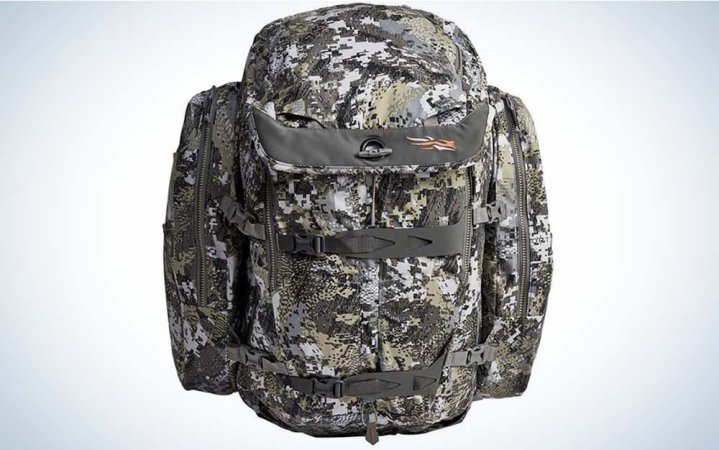
Excellent for hang-and-hunt bowhunters.
See It
Key Features
- Specialized stowing areas for a tree stand and climbing sticks
- Carrying capacity: 2,200 cubic inches
- 23 storage compartments
- Mesh gear viewing windows
- Padded shoulder straps and waist belt
- Weight: 7.5 pounds
Why It Made the Cut
Simply put, if you are a hang-and-hunt bowhunter, this pack will hold everything you want to take to the woods securely and quietly.
Pros
- Roomy
- Sturdy
- Comfortable
- Intuitive pockets
Cons
Product Description
From the first time you hold the Sitka Cargo Box, it’s clear the Sitka engineers went bowhunting with a tree stand and then thought about all the features needed to carry and organize all their gear. The pack initially looks like any other backpack, but it breaks into two sections so you can sandwich a tree stand in between them, rather than simply strapping it to the outside. It also has storage areas on each side that evenly distributes the weight and stows them quietly. The padded shoulder straps and waist belt are sturdy and adjustable, so they can keep a snug fit as you add and remove layers and shift your load to navigate different terrain.
The genius of the Cargo Box’s stand-carrying capabilities is that it’s a snap—unsnap really—to remove the stand and sticks once you reach your favorite tree and it’s time to hang. Simply undo a couple of buckles and pull back some straps to free your equipment. Lash the two halves of the pack back together and now it’s just the pack you’ll hang behind you in the tree. But even with its stand carrying capabilities, the Cargo Box doesn’t eat up the real estate you need to carry the usual gear you need for an all-day sit in the stand.
The deliberate thought about this pack becomes even more evident once you’ve hung your stand. A front flap folds up to hang the pack from the tree so a row of zippered, mesh-faced pockets is exposed. And you can quickly access the gear with a slide of a zipper. Also, the front of the main compartment folds partially down with the pull of two zippers so you don’t have to reach up and over a top lip and then dig to grab your coat or binos. While this pack has all the bells and whistles you need for a comfortable and convenient all-day sit in the stand, the price tag might deter many. But if you want a pack that eliminates all the hassle of carrying bowhunting gear to the stand so you can focus on shooting when it matters, the Cargo Box is hard to beat.
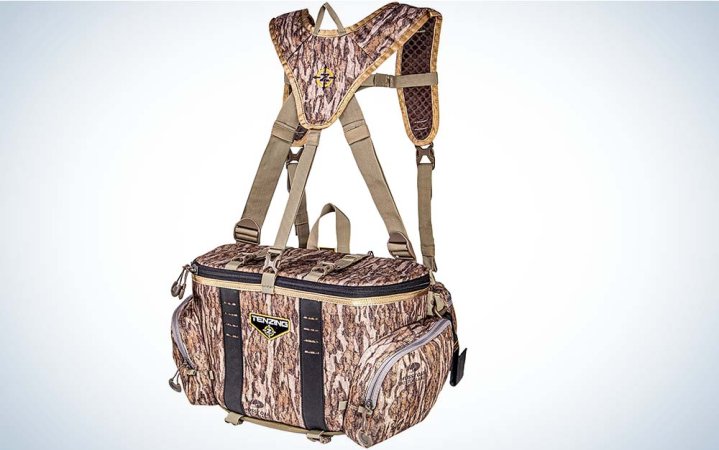
Perfect for quick hunts.
See It
Key Features
- Compact, lumbar-style
- 5 storage compartments
- 5 organization pockets
- Capacity: 750 cubic inches
- Weight: 1 pound, 12 ounces
Why It Made the Cut
The Hangtime lumbar pack is perfect size and design for those quick hunts when you don’t want to lug a big pack into the woods. Just toss in the essentials, huck it onto your back, and go.
Pros
- Rigid shell allows pack to hang or sit open in the stand or blind
- Lightweight
- Compact, yet has a fair amount of storage space
- Easy on shoulders and back
- Intuitive pockets
Cons
- Only available in Mossy Oak Bottomland
Product Description
It’s late October and you have a couple hours after work to spend on stand, hoping to catch that shooter that’s been showing up on your trail cams regularly the last few days. You won’t be out long and don’t need a ton of gear. That’s where the Tenzing Hangtime Lumbar Pack comes in handy. It’s built for speed and comfort. The Lumbar pack slings over your shoulders, but the storage compartment sits just above your hips, rather than your whole back. Think of a big fanny pack with shoulder straps and a waist belt.
This pack has adjustable shoulder straps. waist belt, and chest strap, so you can get it to ride your torso the way you want. I’m a big fan of chest straps on backpacks because when you’re ducking under branches and jumping over streams, simple shoulder straps can slip off or hang up. With the chest strap, you can do somersaults on your way to a stand and your pack will stay on your back.
While it weighs less than 2 pounds, the Hangtime has a generous amount of space–750 cubic inches–for an extra layer of clothes, binos, a rangefinder, Ozonics, all your calls, and more. Once you get into your stand or blind, you can open the lid and hang the pack. Or you can set it on the ground, and the lid stays open for easy access to your gear. The main compartment stands upright and open, thanks to the rigid, molded shell. That means no fighting with the pack to access your gear. Inside that main compartment, mesh pockets organize your vital gear in handy locations, and you can see what’s in each pocket. It might not have the same appeal as traditional packs, but the Hangtime works great for those sporadic or quick hunts.
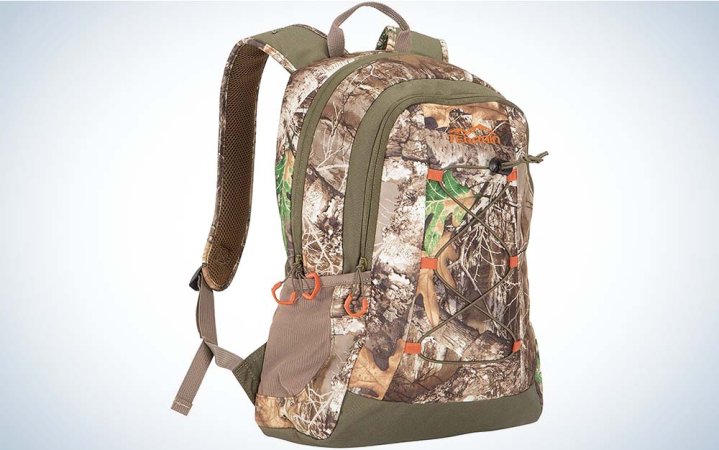
Storage room on a budget.
See It
Key Features
- Capacity: 1,350 cubic inches
- Two large zipper compartments
- Dual, exterior side pockets
- Adjustable, padded shoulder straps
- Top carry handle
Why It Made the Cut
This pack has 1,350 cubic inches of storage space and costs less than $35. Enough said.
Pros
- Decent storage
- Will get your gear into the woods
- Won’t break the bank
Cons
- It doesn’t have the same build quality as higher-end packs
Product Description
Not everyone wants or needs to spend $200 on the best bowhunting backpack. For some bowhunters, the backpack is solely utilitarian. It’s for hauling gear. The Terrain Cape Daypack will do that at a budget-friendly price. This pack has two, large zippered pockets; a deep, full-pack pocket and a smaller one that has three individual pockets inside for basic organization. Two, elastic-top mesh pockets sit low on each side of the pack. Allen says they’re for water bottles, but you could use them for other gear as well.
Weaved onto the front of the pack is an elastic band that you can expand to strap gear to the outside, like a jacket or umbrella. The shoulder straps are padded, though thinly. And if you have to carry a heavy load for a lengthy period, get ready for sore shoulders. Again, this is a simple backpack. There are no frills. It’s for putting stuff in and getting to the woods. But if that’s what you’re in the market for, look no further.
Best Bino Pack: Badlands Bino XR
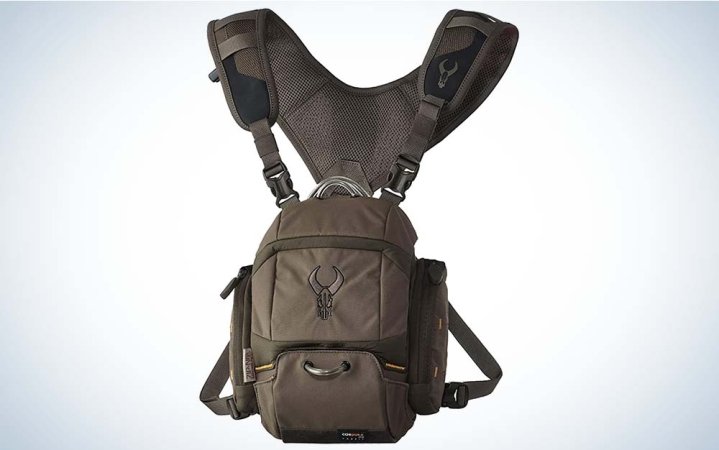
Bino harness that has plenty of room for other gear.
See It
Key Features
- Separate compartments for up to 10×42 binoculars and a rangefinder
- Two zippered side pockets
- Magnetic closure
- Comes with rain cover
- Adjustable mesh shoulder harness
Why It Made the Cut
For its small size, this pack holds a decent amount of gear, and if you use a bino harness anyway, this one will store other essentials, too.
Pros
- Large compartments in a compact pack
- Keeps binos and rangefinder tethered in easy-to-access pockets
- Side pockets ideal for a release, wind indicator, compass, and other small gear
- Magnetic closures open and close quietly
- Lightweight
Cons
- Front flap is a bit large
Product Description
Yes, I know this isn’t a backpack. I mean, you wear it on your chest. But more and more bowhunters are turning to these chest packs for their binoculars and other essential gear. The Badlands Bino XR pack is about as elaborate and voluminous as I’ve seen.
Secure your hunting binoculars—up to 10×42—in the large main compartment via tethers connected to the pack, which opens via magnetic closures. Inside the main compartment, Badlands provides a tethered lens cloth for cleaning your binos and rangefinder glass. At the bottom of the pack, another magnetic pocket holds your rangefinder. Small pockets on either side of the pack can easily store your release, a wind indicator, pocket knife, compass, or other small gear. And they’re conveniently placed at your chest. And on the back of the pack, there’s a large pocket best suited for flat objects, such as hunting licenses, maps, a knife, or an energy bar or two. Inside that pocket is a zippered pocket that holds a tethered, nylon cover you can pull out and stretch over the pack to protect it from rain.
The pack is held on your chest by a typical shoulder harness with straps that connect to the top of the pack, go over each shoulder, and then buckle to the bottom of each side of the pack. Although it holds a lot of gear, this pack will not interfere with your bowstring when it comes time to draw and shoot. It might not be your typical pack, but this supped up bino harness makes a great minimalist option.
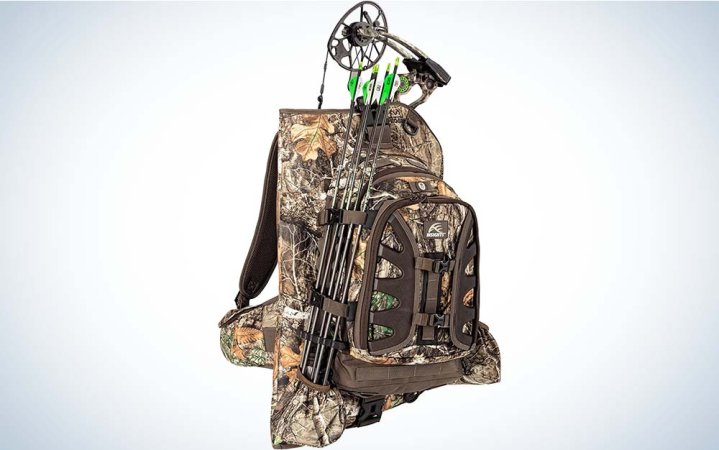
Stores your bow for hand free hikes to and from the stand.
See It
Key Features
- Padded bow case built into the pack
- Dual holsters for quiver and umbrella, camera arm, tripod
- Roomy standard backpack for normal gear
- Outer containment wings ideal for bulky jacket
- Organization pocket includes hanging basket
Why It Made the Cut
Sometimes you need both hands free for the hike in or out of a bowhunt, and this pack offers the most secure, comfortable way of hauling your bow and arrows on your back.
Pros
- Holds your bow and arrows securely
- Plenty of storage for all your other gear
- Quiet
- Many organization pockets
Cons
Product Description
Many backpacks provide systems for strapping your compound bow to them. Typically, those systems don’t hold securely, and the bow flops around or gets caught on brush. In a nutshell, The Vision Bow Pack is a soft bow case with a full backpack sewn to the outside. I securely stowed my Mathews V3X 33 with a 12-inch front stabilizer and a 10-inch siderod, plus an Axcel Landslyde sight that sticks out six inches from the riser. I didn’t have to remove or alter any of my accessories to get my bow to fit, and it’s a big rig by bowhunting standards.

Attached to the bowcase, a full-sized backpack holds plenty of storage for your other gear. On the main compartment is another zippered pocket that can be used in a variety of ways. You can use it for storage. Or you can open it halfway, and it becomes a shelf with mesh-faced pockets exposed. Unzip it completely, and a mesh basket sits upright that you can toss a release, call and/or rangefinder into for quick access.
This is a strategically designed, functional backpack that actually holds your bow securely. Yes, the bow-case portion of the pack creates added bulk, but that part is against your back, so you don’t notice it as much as you might think.

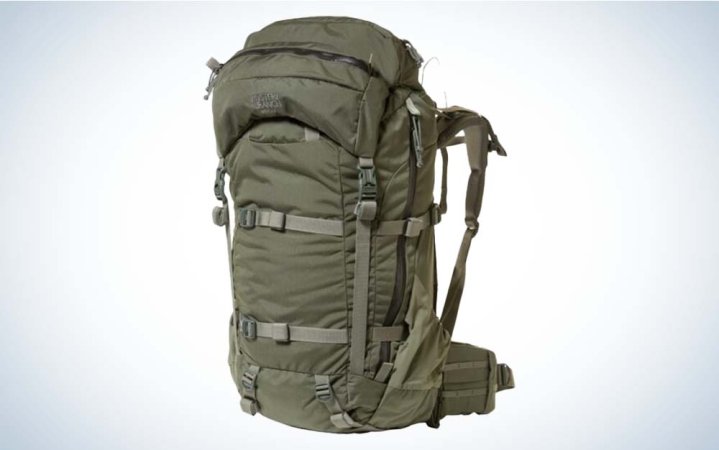
Separates your gear and meat for optimal storage.
See It
Key Features
- Patented Overload system keeps meat separate from gear
- Removable lid
- Side access with special storage bag
- Five-section segmented waist belt
- Storage capacity: 4,333 cubic inches
- Weight: 5.7 pounds
Why It Made the Cut
The Mystery Ranch Metcalf has room to carry all the camping and hunting gear you need to spend several days in the backcountry, and the Overload System allows you to separate that gear from meat if you’re lucky enough.
Pros
- Overload system puts the meat close to your back to minimize weight shifting
- Comfortable belt and shoulder straps
- Massive storage and hauling capacity
Cons
- While there’s plenty of room for your gear, there’s not as much for meat
Product Description
The Mystery Ranch Metcalf is a huge backpack connected by straps and buckles to the Guide Light MT Frame. This is a lightweight, rigid frame built to haul your gear and meat comfortably. In the backpack, you’ve got ample room for your tent, cooking, and hunting gear. On the outside, you can lash a sleeping bag and pad, if you want.
A removable top portion gives you extra space for more gear. With that in place, the Metcalf has a nice, long side zipper, so you can get to gear inside the pack without having to remove the top. And that side zipper also exposes a self-contained, attached storage bag to further organize your gear (like keeping dirty laundry separate from clean clothes).
The genius of the Metcalf is the patented Overload System. Disconnect the pack from the frame, set a loaded meat bag on top of it, and then strap your pack back on over the meat. With that setup, the meat sits close to your back, so it won’t shift as easily as it would if the positions were reversed. Comfortable shoulder and waist straps are critical to a bowhunter’s backpack. To haul heavy loads, you need nicely padded weight support points. The Metcalf provides that comfort – especially in the five-section segmented belt that conforms to your shape.
FAQS
I really struggled with this one because there are at least four solid backpack manufacturers revered within the bowhunting community, but I’m going to give the nod to Badlands for the best brand. Their packs are well-made, comfortable, and strategically designed in terms of handles, number of pockets, and pocket locations. They’re soft, quiet, durable, and they do their job well. They also have a pretty solid lifetime warranty, so if something goes wrong or you’re not happy with something, Badlands will make it right.
What you do with your backpack will determine how long it lasts. Realistically, the average tree-stand bowhunter should be able to get 20 years or more out of a backpack. Typically, the packs only go from the house to the truck to the tree and back again. I certainly have backpacks 20 years old that are still usable and also weren’t as well made as the packs available today. But the rougher you are with a pack, the sooner it’ll start to break down.
Technically you don’t need a backpack for hunting, but they do make it easier if you tend to carry a lot of gear. If you don’t have far to walk or hunt in places where stands are already hung, you might not need a backpack. However, if you have a long walk and need to pack in more layers, food, grunt calls, wind indicators, etc., then having a backpack will make carrying all of those items much more manageable.
How to Choose a Bowhunting Backpack
Think of what you like to take with you on a hunt. Now think about where you hunt. The perfect bowhunting backpack for you should hold all your stuff and allow you to get where you need to go with relative comfort. If you don’t pack much gear and don’t have far to go, probably anything with a pocket will work. But if you tend to carry a lot of stuff and need to cover multiple miles over harsh terrain, a high end pack will make life easier for you, at least hunting wise. And if that’s the case, be sure to get a pack that has thick padding on the shoulder straps and even a waist strap to help it ride nicely and load your pack in a comfortable way.

Before you buy a pack, test the zippers. A good zipper should feel solid and move freely in both directions quietly. Cheap zippers feel, well, cheap. They don’t zip freely in either direction and tend to make a lot of noise.
If you’re a hunt and hang hunter, you’ll want a pack that’s easy to hang in the stand and stores your gear at your fingertips. You don’t want to have to worry about which pocket your grunt tube is in when a big buck pops into view.
Final Thoughts
The best bowhunting backpacks are the ones that you really don’t have to think much about. From the storage compartment to the fit, accessing your pack should feel second nature. And when you’re not having to think about your backpack, you can think more about what matter, like your next shot.
Read the full article here

